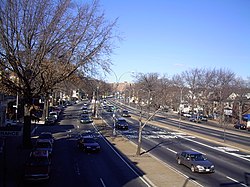Woodhaven, New York
| Woodhaven | |
|---|---|
| Neighborhood of Queens | |

|
|
| Country |
|
| State |
|
| City |
|
| County/Borough |
|
| Population | |
| • Estimate (2008) | 27,699 |
| Ethnicity | |
| • White | 20.2% |
| • Black | 5.3% |
| • Hispanic | 43.6% |
| • Asian | 13.7% |
| • Other | 25.3% |
| Economics | |
| • Median income | $51,596 |
| ZIP Code | 11421 |
| Area code(s) | 718, 347, 917, 929 |
Woodhaven is a middle-class neighborhood located in the central section of the New York City borough of Queens. Woodhaven, once known as Woodville, has one of the greatest tree populations in the borough and is known for its proximity to the hiking trails of Forest Park. It retains the small-town feel of bygone days and is home to people of many different ethnicities.
Woodhaven is bordered on the north by the public Forest Park, and Park Lane South. Woodhaven also borders Richmond Hill to the east, and Ozone Park to the south at Atlantic Avenue. Its western border is the borough of Brooklyn.
The ethnically diverse neighborhood is part of Queens Community Board 9. Woodhaven's ZIP Code is 11421. Woodhaven is served by New York City Department of Education School District #27 (Bounded by Nassau County on one side and Brooklyn on the other).
The Wisconsin Glacier retreated from Long Island some 20,000 years ago, leaving behind the hills to the north of Woodhaven that now are part of Forest Park, the third largest park in Queens. Southern Woodhaven is mostly flat (the lowest elevation is just under 30 feet (9.1 m) ), while northern Woodhaven gradually rises to about 105 feet (32 m) as it approaches Forest Park.
European settlement in Woodhaven began in the mid-18th century as a small town that revolved around farming, with the Ditmar, Lott, Wyckoff, Suydam and Snediker families. British troops successfully flanked General George Washington's Continental Army by a silent night-march from Gravesend, Brooklyn through the lightly defended "Jamaica Pass" actually located in Brooklyn, to win the Battle of Long Island, Queens—the largest battle of the American Revolutionary War, and the first battle after the Declaration of Independence.
...
Wikipedia
